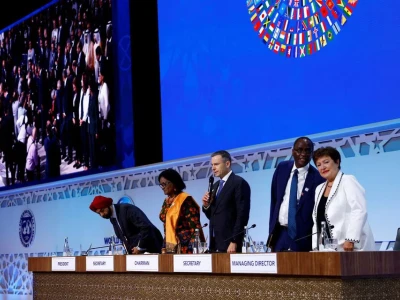
World Bank warns climate change threatens Maldives’ tourism, fisheries
The CCDR emphasises the importance of unlocking private climate finance to address the challenges ahead.
Top Stories
Maldives, a nation whose economy depends heavily on tourism and fisheries, is facing severe risks due to climate change, according to a new report by the World Bank Group.
The Maldives Country Climate and Development Report (CCDR), released on Tuesday, highlights the vulnerabilities of the country’s marine ecosystems, coral reefs, and fisheries, warning that without urgent action, the consequences could be dire for both the economy and the environment.
Tourism and fisheries account for nearly half of the Maldives' GDP and employment. The CCDR outlines that these sectors are increasingly threatened by climate-related challenges such as coral reef degradation, sea-level rise, and coastal flooding. The report projects significant damage to natural resources and assets if global temperatures continue to rise, urging immediate adaptation measures.
Maldives’ coral reefs, vital for beach formation, coastal protection, and tourism, are under severe stress. The report warns that if global temperatures exceed 2°C, the country could lose nearly all of its coral cover. This would have devastating effects on tourism, which is largely built around the appeal of the Maldives’ pristine reefs. The report underscores the urgent need for both global emission reductions and stronger local conservation efforts to protect these critical ecosystems.
“Maldives is at a critical juncture where the impacts of climate change and ongoing economic challenges converge. The Maldives Country Climate Development Report outlines a pathway for the country to not only safeguard its natural assets but also build a more resilient and sustainable economy," David Sislen, World Bank Country Director for Maldives, Nepal, and Sri Lanka, said.
The CCDR forecasts that sea levels could rise by as much as 0.9 meters by 2100. This rise could result in severe coastal flooding, threatening up to 3.3 percent of the Maldives' assets by 2050. Without effective adaptation strategies, the report estimates damages of up to $1.1 billion, with GDP potentially reduced by 11 percentage points under a high-emission scenario. However, with strategic investments, this impact could be halved.
The report calls for national adaptation plans to integrate sea-level rise and flooding scenarios into development planning, recommending a mix of hard protection infrastructure, nature-based solutions, and island elevation tailored to the needs of individual islands.
The Maldives’ high public spending on infrastructure has pushed public debt to 123 percent of GDP as of 2023, raising concerns about the country’s ability to finance necessary climate and strategic investments. The report stresses the importance of fiscal reforms and external financing to build resilience.
To address these financial challenges, the CCDR recommends removing blanket subsidies, improving healthcare efficiency, and reducing inefficiencies in State-Owned Enterprises (SOEs). These measures would help create space for climate-related investments while ensuring macroeconomic stability.
The fisheries sector, another pillar of the Maldivian economy, is also at significant risk. The report warns that fish catches could decline by up to 100 percent by the end of the century, depending on emission levels. Urgent adaptation measures, including diversifying fisheries and investing in climate-resilient infrastructure, are essential to safeguard this industry.
The CCDR emphasises the importance of unlocking private climate finance to address the challenges ahead.
Imad Fakhoury, IFC’s Regional Director for South Asia, highlighted the need for sustainable financial instruments and strategic partnerships: “Unlocking the full potential of private climate finance is crucial to address the climate crisis and build resilient, sustainable economies.”
The report also calls for the operationalisation of the Maldives’ Climate Finance Hub, the development of a climate investment plan, and the creation of a national carbon market strategy to mobilise the necessary finance for climate action.
The World Bank CCDR identifies six key objectives for the Maldives to build climate resilience and drive sustainable development:
-
Strengthening fiscal and external buffers to finance climate action
-
Mobilising climate finance through new and existing channels
-
Enhancing the resilience of islands and infrastructure to climate impacts
-
Preserving ecosystems through coral management and marine protection
-
Supporting livelihoods in tourism and fisheries through research and regulations
-
Unlocking development benefits from green transitions in energy, mobility, and waste management
Adaptation to rising sea levels alone will require investments of up to $4 billion, with the report urging policy reforms to ensure macroeconomic stability and fiscal space for these investments. Public-private partnerships and concessional financing will also be crucial to meeting the financing needs.
Hiroshi Matano, MIGA Executive Vice President, stressed the importance of international support, stating, “Mobilising the necessary financing for climate action in the Maldives requires a concerted effort from all stakeholders, including the international community.”
The report concludes that while the Maldives faces significant challenges, proactive adaptation and strategic investments can help the country build a resilient, sustainable future.




